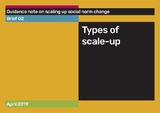Guidance Note on Scaling up Social Norm Change: Types of Scale Up (Brief 02)
Date
2019-04Author
Carter, Becky
Apgar, Marina
Mohmand, Shandana Khan
Metadata
Show full item recordImpact
Abstract
This paper is one of four companion Briefs to the main guidance note on scaling up social norm change. The second brief focuses on the types of scale-up: horizontal, vertical, functional, organisational, and evidence and learning to scale up. Horizontal scale-up refers to the process of taking an intervention (often a new innovation and/or small-scale pilot) and expanding this to achieve a wider (or deeper) coverage or implementing it in new contexts. Vertical scale-up refers to acting to encourage and support “policy, political, legal, regulatory, budgetary or other... systems changes” to achieve national or subnational institutionalisation. (WHO & ExpandNet, 2010, p. 21). Functional scale-up refers to the integration of inclusive norm components with existing services and programmes. Existing programmes can be a platform to achieve scale, enabling social norm interventions to benefit from an established service or programme’s reach and legitimacy, as well as benefit from the synergy between their outcomes (Carter et al., 2018). Scale-up is likely to involve some form of organisational scaling. This could include: growing “an ‘originating’ organisation that develops and pilots the models”, with that one organisation continuing to implement scale-up through its own structures; involving new organisations, in new locations and/or new capacities, to implement the scale-up; and expanding other partnerships and networks (Hartmann & Linn, 2008, p. 28; Cooley et al., 2016).
Citation
Carter, B. with Apgar, M. & Khan Mohmand, S. (2019). Brief 2. Scaling up social norm change: Types of scale up. K4D Emerging Issues Report. Brighton, UK: Institute of Development Studies.Is part of series
K4D Emerging Issues Report;21bRights holder
© DFID - Crown copyright 2019Collections
- K4D [937]

